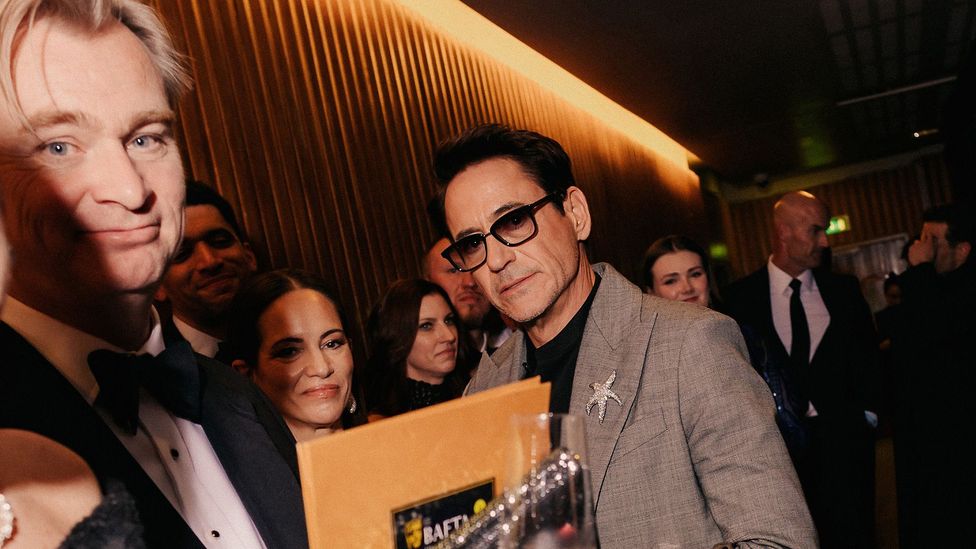What Oppenheimer did for Robert Downey Jr

When someone wins an award for acting in a film, they usually thank the film’s director. But on Sunday, when Robert Downey Jr picked up a Bafta for best supporting actor in Oppenheimer, his thanks to Christopher Nolan were especially effusive. In particular, he paid tribute to “that dude Chris Nolan” for encouraging him to take “an understated approach, perhaps as a last-ditch effort to resurrect my dwindling credibility”.
More like this:
– The one thing Oppenheimer gets wrong
– The real reason Barbie was snubbed by the Oscars
– Could Lily Gladstone win the best actress Oscar?
This remark raised an obvious question: why did Downey Jr think his credibility was dwindling? Thanks to his long stint as Iron Man / Tony Stark in the Marvel Cinematic Universe, he was one of the highest-paid paid A-listers in Hollywood, and he was credited for bringing a mature and relaxed sensibility to the superhero genre – not least by Nolan himself. “He has such charisma as Tony Stark,” the director said on The Late Show with Stephen Colbert. “Him playing Iron Man is one of the most consequential casting decisions that’s ever been made in the history of the movie business.”

Nolan and Downey Jr have been full of praise for each other during awards season (Credit: Getty Images)
So why did Downey Jr feel that his credibility needed a boost? The answer can be found on his CV, which shows that in the four years between the release of his Marvel swan song, Avengers: Endgame, in 2019, and Oppenheimer in 2023, he had acted in just one film – and that film was Dolittle, a disastrous pile-up of bad jokes, gaping plot holes, painful accents, CGI animals, and obvious reshoots.
The film, which was co-produced by his wife, Susan Downey, was a flop, much to the horror of someone who had come to see big-budget family adventure films as his comfort zone. “At that point I was bulletproof. I was the guru of all genre movies,” Downey Jr said in The New York Times Magazine last July. Dolittle was, he continued, “a two-and-a-half-year wound of squandered opportunity”.
It was also a wake-up call – or as he put it, a “reset of priorities”. Downey Jr was in his mid-50s, coming to the end of his action hero years. But since 2008, he had been in 10 Marvel films, two Sherlock Holmes films, and not much else. If he couldn’t launch a new blockbuster franchise, then what could he do? “I was at a place in my life, in my career, where I needed someone to have a vision of what was possible for me that I couldn’t see for myself,” he said at a Q&A in February. That someone was Nolan.
When the director was casting Oppenheimer, Downey Jr’s box-office appeal might well have been a factor, but this wasn’t the first time that he had persuaded a mainstream superstar to stretch the acting muscles they hadn’t used in a while: he’d cast Matthew McConaughey in Interstellar just as the “McConaissance” was beginning. “You’re always looking to work with great actors,” he said in the New York Times in February, “but you’re also looking to catch them in a moment in their lives and careers where you’ve got something to offer them that they haven’t done before, or haven’t done in a long time.”
And so he coaxed Downey Jr to shrug off the armour of wisecracking, swaggering Tony Stark and to immerse himself in Lewis Strauss, the bitter chairman of the Atomic Enemy Commission who opposes J Robert Oppenheimer (Cillian Murphy). “I just really wanted to see this incredible movie star put down all of that baggage, that charisma, and just lose himself in a dramatic portrayal of a very complicated man.”
A spartan approach
The timing was perfect. Nolan wanted Downey Jr to bring some restraint and complexity to his portrayal of Strauss, and Downey Jr was ready to venture into uncharted territory. Emily Blunt recalled warning Downey Jr that the reserved and cerebral British director’s methods would be quite a contrast with what he had been used to at Marvel. “I said, ‘You’re going to just love it so much and the screws are going to get tightened on you so much and it’s just the most focused, wonderful, unchaotic set. But you’re going to get some very British compliments. There will be no smoke blown up your ass, and you’re going to have to be all right with it.'”
Downey Jr was more than all right with it. “Getting to see the spartan, almost monastic way he approaches this art form,” he said, “it was like going to the other side of the Moon.” At the Baftas, he said that he owed his award in part to Oppenheimer director Christopher Nolan’s “British sensibility”.
The smart money is on the revitalised Downey Jr following his Bafta win with a victory at the Oscars. But even if that doesn’t happen, Oppenheimer has brought about a new phase of his career. The film hasn’t just reminded the world that he is a gifted dramatic actor, it’s reminded him, too. There’s a good chance that he’ll appear in more of Nolan’s films in the future. There’s an even better chance that he won’t appear in anything as excruciating as Dolittle ever again.
If you liked this story, sign up for The Essential List newsletter – a handpicked selection of features, videos and can’t-miss news delivered to your inbox every Friday.
If you would like to comment on this story or anything else you have seen on BBC Culture, head over to our Facebook page or message us on Twitter.








